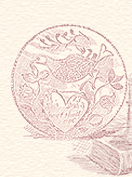Ihr liewe leit:
'S iss Zeit fer zerrickgeh zu de Yaahrbicher vun der
Pennsylvaanisch Deitsch Gesellschaft, desmol zerrick zu Nummer 12 (1903) wu
mer zwee Addikel iwwer un in PD finne kann. Im aerschde Schtick finnt mer 16
Iwwersetzinge ass der Thomas C. Zimmerman (1838-1914) schunn 1901 waehrend der
PDG Versammling in Harrisbarrick hot vorgelese.
Kennt's sei ass eenichebber wu sei eegner Mudderdialekt gut kenn
net leicht annere Schprooche in se Dialect iwwersetze kann? In seinre
Eileiding saagt uns der Zimmerman ass er gaar net zufridde iss mit seine
Iwwersetzinge weil er - well, er hot lauder feine Wadde benutzt fer uns zu
saage ferwas des waahr waer, awwer was er warricklich saage hot wolle waar, "Fer
die Iwwersetzinge mache hawwich net mei PD Mudderschprooch/Dialekt benutze
kenne wie ich sie benutze deet wann die Gedanke ass ich iwwersetze hab misse
mei eegne Gedanke waere."
Es scheint ass yuscht in seim Mudderdialekt kann der
Dialektschwetzer genaa saage was er genaa saage will. Der Mudderdialekt iss
was der Dialektschwetzer benutzt fer sei eegne Gedanke auszudricke, net die
Gedanke ass 's aerscht in annere Schprooche ausgedrickt warre.
Beweis? Schiergaar nimmand weess eenichebbes vun Zimmerman seine
Iwwersetzinge ausser em Clement C. Moore sei "Die Nacht vor die Grischdag" --
un's iss net die reecht Yaahreszeit fer sell Gedicht.
Im zwedde Addikel finnt mer em Lee L. Grumbine (1858-1904) sei 15
Gedichde; siwwe sin Iwwersetzinge un, wie schunn erwehnt, 's gebt kaam en
Leser unner eich liewe Leser wu ebbes vun denne weess.
Die acht Gedichde ass der Grumbine selwer uffgedenkt hot kann mer
efders finne, awwer eens devun, "Der Alt Dengelschtock," kann mer saage iss
gewiss es bescht.
Ya, was kennt meh Deitsch sei ass en Dengelschtock? Un wann der
Schtofft deitsch iss, dann fliesst dei Mudderschprooch graad so fatt, en
Freeht zu lese.
Der alt Dengelschtock,
Datt schteckt er im Block,
Unnerm alde Pundabbelbaam;
Am Nascht henkt die Sens -
Der Reche bei der Fens -
Seh alles wie en scheener Draam.
Die Sunn geht uff,
Kumm, Buwe, schteht uff,
Schunn lang sin die Haahne am Greehe;
Dihr faule Bengle,
Macht eich ans Dengle,
Nooch em Friehschtick geht's and Meehe.
Meh neegscht Woch.
Macht's gut,
Der Alt Professer
|
Dear people:
It is time to go back to the yearbooks of the Pennsylvania German
Society, this time back to Number 12(1903) where one can find two articles
about and in Pennsylvania German (Dutch). In the first piece one finds 16
translations that Thomas C. Zimmerman (1838-1914) read during the
Pennsylvania German Society yearly meeting at Harrisburg in 1901.
Could it be that someone who knows his own mother tongue well
cannot easily translate other languages into his dialect? In his
introduction Zimmerman tells us that he is not satisfied with his
translations because he - well, he used lots of fine words to tell us why
that was true, but what he really wanted to tell us was, "In order to make
the translations I couldn't use my Pennsylvania German mother
tongue/dialect as I would use it if the thoughts that I had to translate
had been my very own."
It seems that just in his own language can the dialect speaker say
exactly what he exactly wants to say. The mother dialect is what the
dialect speaker uses to express his own thoughts, not thoughts that were
expressed first of all in other languages.
Proof? Almost nobody knows anything about Zimmerman's translations
except perhaps Clement C. Moore's "The Night Before Christmas" - and it
isn't the right time of year for that poem.
In the second article of the 1901 yearbook one finds Lee L.
Grumbine's (1858-1904) 15 poems; seven are translations and, as already
mentioned, there is hardly a reader among you dear readers who knows
something about them.
The eight poems that Grumbine thought up himself can be found quite
often, but one of them "The Old Hammering/Sharpening Anvil," can be said
to be definitely the best.
Yes, what could be more PG that an anvil upon which the PG farmers
sharpened their scythes? And when the subject matter is pure PG, then the
mother tongue just flows along so that it is a joy to read.
The old sharpening anvil,
There it sticks in the chopping block,
Under the old pound-apple tree;
On a branch hangs the scythe-
The rake at the fence-
I see everything as if in a nice dream.
The sun rises,
Come, boys, get up (out of bed),
Already long have the cocks been crowing;
You lazy fellows,
Start in to hammer (your scythes).
After breakfast we start in to mow.
More next week.
Take care,
The Old Professor
|













